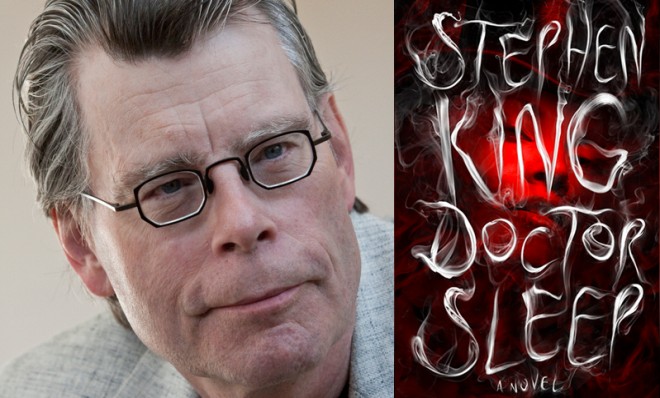Doctor Sleep: Everything you need to know about Stephen King's The Shining sequel
The new novel follows a grown-up Danny Torrance, who survived his father's murderous rampage, as he faces a new supernatural threat


There are few contemporary horror stories more revered than Stephen King's The Shining, which has been frightening audiences, book lovers and cinephiles alike, for more than 30 years. The story ends with the death of its protagonist, Jack Torrance, but there's always been a dangling thread: The ultimate fate of his son, Danny Torrance, who survived his father's descent into madness at the Overlook Hotel.
After 36 years, Stephen King has finally picked up that dangling thread and returned to the world of The Shining with Doctor Sleep, a Danny Torrance-centric sequel. Why did Stephen King finally decide to write a sequel to The Shining? How does it relate to Stanley Kubrick's acclaimed film adaptation? And is Doctor Sleep a worthy follow-up to one of King's most acclaimed and frightening novels? Here, everything you need to know about Doctor Sleep:
What is Doctor Sleep about?
The Week
Escape your echo chamber. Get the facts behind the news, plus analysis from multiple perspectives.

Sign up for The Week's Free Newsletters
From our morning news briefing to a weekly Good News Newsletter, get the best of The Week delivered directly to your inbox.
From our morning news briefing to a weekly Good News Newsletter, get the best of The Week delivered directly to your inbox.
The story starts a year after the conclusion of The Shining, which ended with the death of Jack Torrance and the destruction of the Overlook Hotel. The story follows Jack's son Danny Torrance, who survived the surreal events of the original novel, as he grows into middle age. According to King's website, Doctor Sleep's central story takes place in a New Hampshire town, where Danny works at a hospice and uses his "shining" to comfort patients as they die. When he discovers a young girl with powers even stronger than his own, he resolves to protect her from a quasi-immortal cult that travels the country, feeding on those who have the shining.
Why did it takes Stephen King 36 years to write a sequel to The Shining?
"People kept asking me," said King in an interview with the BBC. "I'd go to autograph sessions and they'd say, 'Whatever happened to that kid from The Shining?'" And I've never been someone who wanted to revisit the past. In particular, I'm really leery about revisiting the scary books, because I feel like a lot of people read those books under the covers with flashlights when they were children themselves — 12, 14 years old. You meet people who say, 'I read that book The Shining, or I read that book Salem's Lot, and it really scared the hell out of me.' And I'm thinking to myself, sure, you were easy. You were 14 and away from camp and shaking in your shoes. The fear is that people will come back expecting that kind of fear as grown-ups, and that just never happens."
So... what made him finally decide to write a sequel?
A free daily email with the biggest news stories of the day – and the best features from TheWeek.com
"I was just kind of curious about what would happen to [Danny Torrance], because he was a real child of a dysfunctional family," said King. But the second catalyst for Doctor Sleep was an actual cat: Oscar, a cat who lived at a hospice and became famous for being the first to "know" when a patient was going to die. "It always takes two things to get me going," said King. "it's like the cat was the transmission and Danny was the motor."
How does Doctor Sleep relate to Stanley Kubrick's 1980 film adaptation of The Shining?
Stanley Kubrick's Jack Nicholson-starring take on The Shining is widely regarded as one of the most frightening and effective horror movies of all time — but King himself has never been a fan, dismissing it as "cold" and calling Shelley Duvall's Wendy Torrance "one of the most misogynistic characters ever put on film." Fans of the the film might be disappointed to learn that King has emphatically insisted that Doctor Sleep is only a sequel to his novel, with a significantly different continuity than the film: "At the end of the Kubrick film, the Overlook is still there. It just kind of freezes. But at the end of the book, it burns down."
Is Doctor Sleep a worthy successor to The Shining?
Early reviews have been mixed to positive. The New York Times says Doctor Sleep has "its own vivid frightscape" that doesn't feel too derivative, and calls the book "scary enough to match the first book, though not better or scarier." USA Today calls Doctor Sleep a "tour de force about family and redemption starring two of the author's more memorable protagonists." The AV Club calls it "entertaining enough," but also notes that King has "produced so much better than Doctor Sleep."
Still on the fence about Doctor Sleep? You can read an excerpt of the book at The Huffington Post.

Scott Meslow is the entertainment editor for TheWeek.com. He has written about film and television at publications including The Atlantic, POLITICO Magazine, and Vulture.
-
 Will AI kill the smartphone?
Will AI kill the smartphone?In The Spotlight OpenAI and Meta want to unseat the ‘Lennon and McCartney’ of the gadget era
-
 Must-see bookshops around the UK
Must-see bookshops around the UKThe Week Recommends Lose yourself in beautiful surroundings, whiling away the hours looking for a good book
-
 A Nipah virus outbreak in India has brought back Covid-era surveillance
A Nipah virus outbreak in India has brought back Covid-era surveillanceUnder the radar The disease can spread through animals and humans
